Loud calls to action follow murder of young Turkish woman
- Published
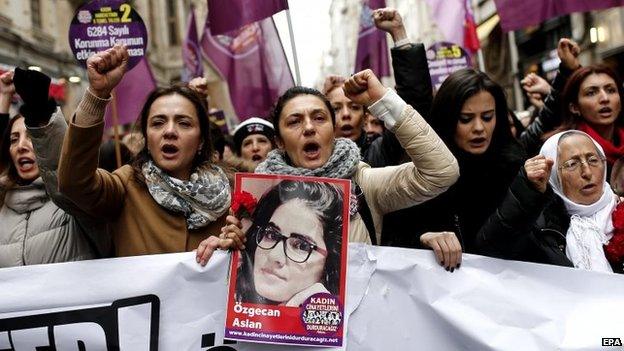
The murder of student Ozgecan Aslan has led to protests in Turkey
Turkey has been mourning the murder of a young woman for the last week.
Ozgecan Aslan, a 20-year-old psychology student, was stabbed in a minibus while resisting a rape attempt on her way home.
Her burned and dismembered body was found on Friday. Three men have been arrested in connection with her murder.
On Wednesday, not long after this incident, another woman's dismembered body was found dumped in a bin. Her husband of 17 years admitted to the murder.
'Last straw'
Women's rights organisations have for years been trying to raise awareness about the rise in violence against women that has taken place in the last decade.
According to local reports, between 2003 and 2010 there had been a 1,400% increase.
Many women think that this is linked to the policies or rhetoric of the governing party in Turkey, which has its roots in political Islam and has been in power since 2002.
Feminist lawyer Hulya Gulbahar says the murder of Ms Aslan is the last straw.
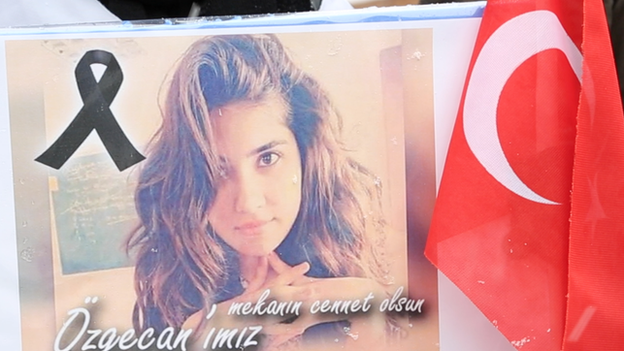
Ms Aslan's murder comes amid a dramatic rise in violence against women in Turkey
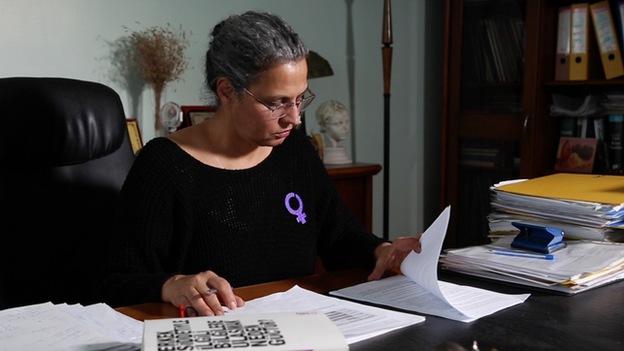
Ms Gulbahar says women are also facing greater "political violence"
"The government is constantly making propagandist statements such as 'women and men being different by nature' or 'motherhood being the sacred role of women'. So we are facing a political violence here," she argues.
In November 2014, President Recep Tayyip Erdogan said: "Women cannot be treated equal to men."
He has tried to introduce laws to curb abortion and has also advised women to have at least three children.
Turkey's Deputy Prime Minister, Bulent Arinc, commented last year that women should not laugh out loud in public.
Last month, Health Minister Mehmet Muezzinoglu said: "The best career for women is motherhood."
No proper protection
Gulsum Onal from the organisation Stop the Murder of Women Platform, says several laws have been amended in recent years to protect women from violence. However, she says that there are problems in the enforcement of these laws.
"Even women who are under official protection are getting killed. The official court documents can be found in their purses when they are murdered," she says.
Muhterem Gocmen, 31, was one such example. She was stabbed to death by her husband in 2013.
Although her husband was told by a court to keep a distance of at least 200m (yards) from Ms Gocmen, he showed up at the hairdressing salon where she worked.
He stabbed her eight times.
Ms Gocmen's sister Cigdem Evcil says she was killed because she wanted a divorce. "She was subject to violence for 13 years. She had had enough," she tells me.
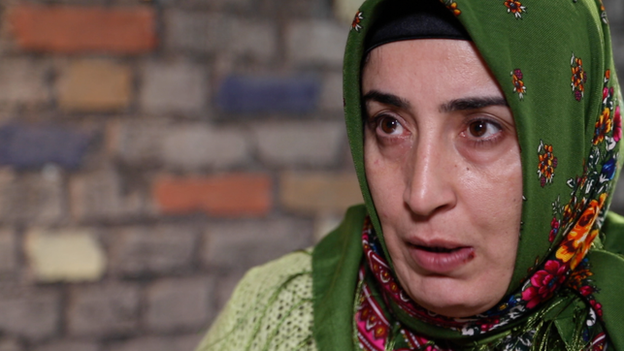
Ms Evcil believes that her sister was killed because she wanted a divorce
Ms Evcil says her sister's husband had previously defied court orders preventing him from approaching her and argues that he had to be arrested but was set free by the prosecution.
"If he was detained only for 10 days my sister would have been alive today. They tell me, this was her destiny. No, I don't believe that. My sister was left alone to die," she says.
In Turkey, most women's murders are perpetrated by their partners or ex-partners.
Asking for a divorce is one of the main causes leading to murder. However, women get killed for rather trivial reasons too.
'It could have been me'
Ms Gulbahar gives examples from recent court cases. They include: putting too much salt in food, answering a phone call too late, wearing leggings, looking for a job or having a tattoo done.
"A woman can get killed because she replied a phone call or because she didn't," she says.
She argues that the state should stop trying to save marriages and to mediate between husbands and wives. Instead, it should focus on protecting women from violence.
Ms Aslan's murder seems to have struck a strong chord in Turkish society.
She was murdered on her way home, on public transport. Many women thought: "It could have been me."
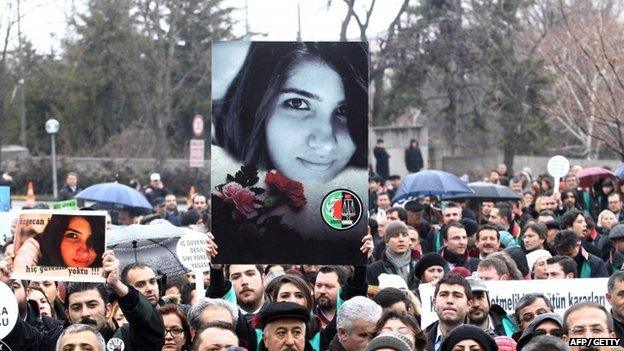
Ms Aslan's murder seems to have struck a chord with Turkish people
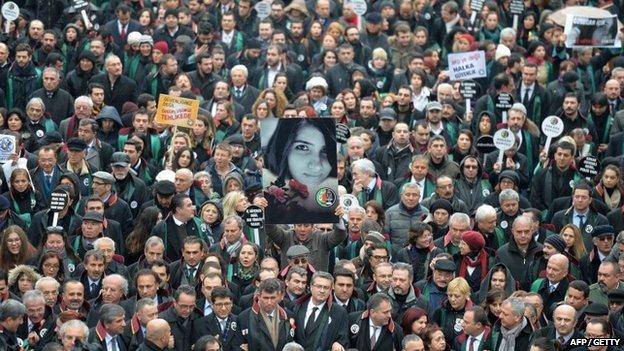
The 20-year-old was killed on public transport as she made her way home
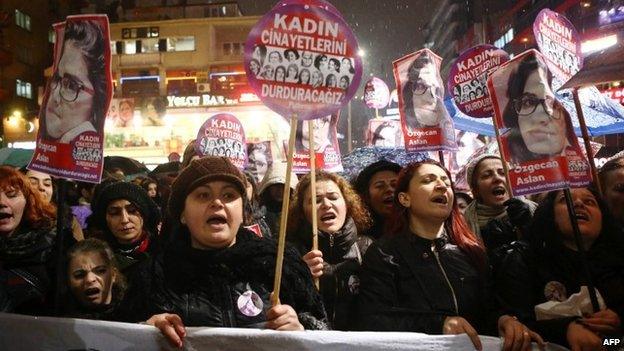
The circumstances of her death have prompted a wave of empathy both on the streets and social media
Many men thought: "It could have been my daughter, my wife or my girlfriend."
That prompted a wave of empathy. Both on the streets and on social media.
Ms Aslan's name appeared more than four million times on Twitter.
Women started sharing their own experiences of sexual abuse and harassment using a hashtag - #sendeanlat.
Watershed moment
The hashtag - which can roughly be translated as "tell your story" - was first used by an academic, Idil Elveris.
"Women are constantly being told what to do, what not to do. We just decided to leave all that behind and start talking," she says.
"One tweet particularly touched my heart. It read: A nation cries silently. This was a collective mourning and could not have been expressed more beautifully."
Hulya Gulbahar says that Ms Aslan's murder might be a watershed moment in their struggle to prevent violence against women.
"This society always finds excuses to justify the rape and murder of women. But now there is no excuse to whitewash the murder.
"Women and men from all political backgrounds have been protesting since Ozgecan's death. I think this gives a hopeful message for Turkey."
- Published15 February 2015
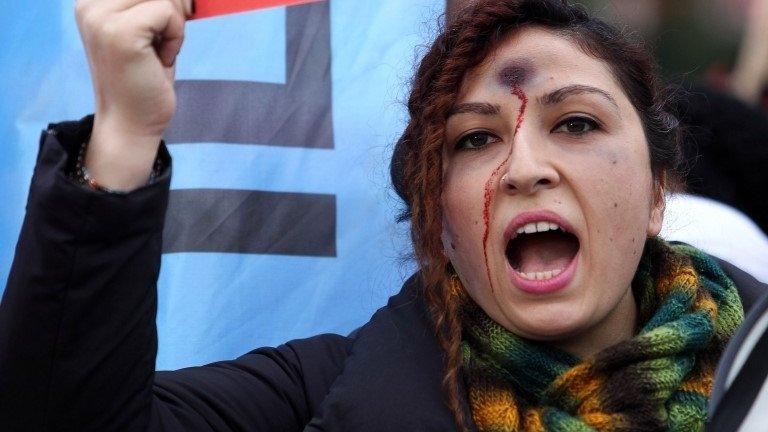
- Published24 November 2014

- Published6 February 2015

- Published22 August 2023
